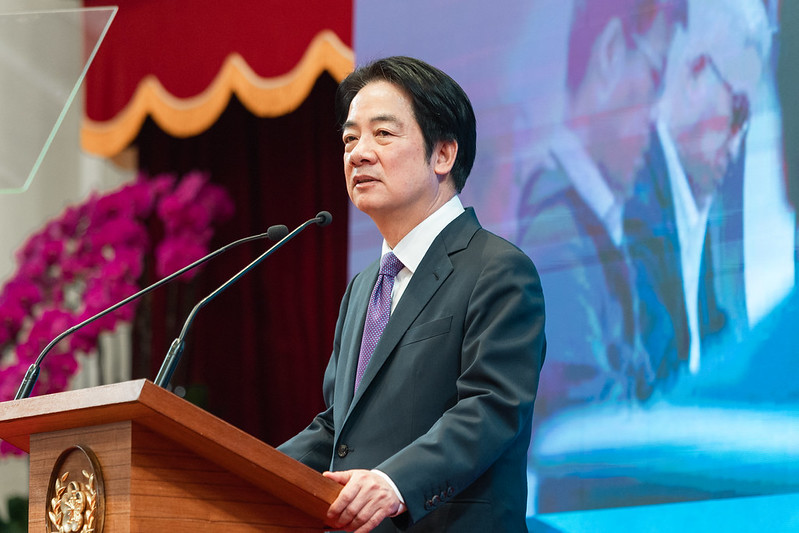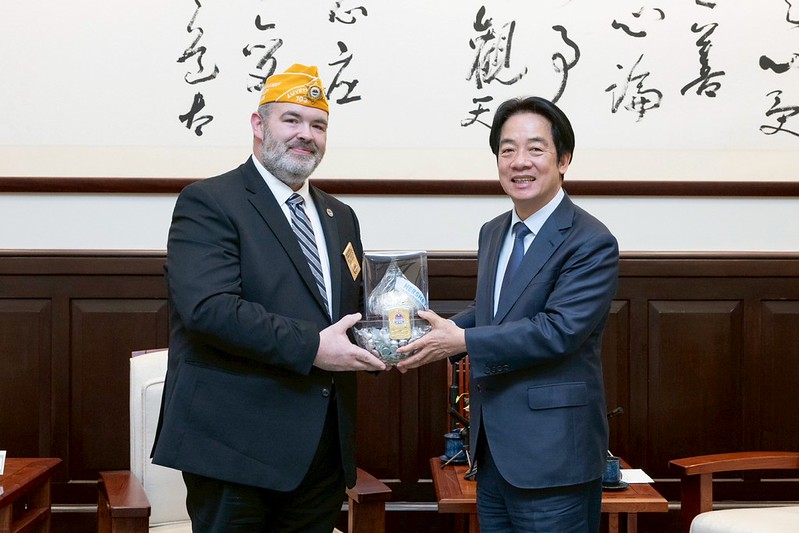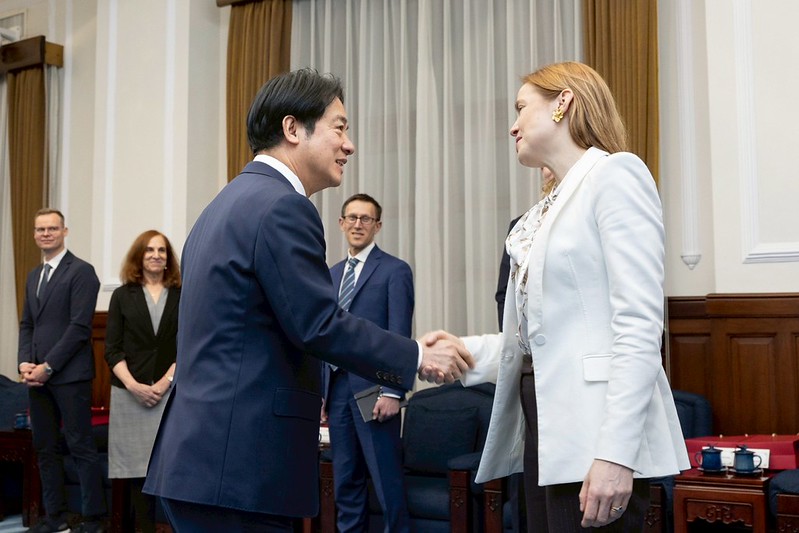News & activities
 News releases
News releases
President Tsai Ing-wen was recently interviewed via videoconference by The New York Times for its DealBook Summit, during which she responded to questions regarding Taiwan-United States relations, cross-strait relations, and the semiconductor industry.
The DealBook Summit is a major annual event held by The New York Times that invites the world's most influential leaders and elites in politics, business, and culture to share their views and experiences. This year's summit was held on November 29 (US EST) in New York City's Lincoln Center for the Performing Arts, and included such attendees as US Vice President Kamala Harris, former US House Speaker Kevin McCarthy, Tesla founder Elon Musk, and Nvidia founder and CEO Jensen Huang (黃仁勳).
A transcript of the interview follows:
Q: I want to start with an issue I think that everybody is thinking about, which is that in the aftermath of the APEC meeting between President [Joe] Biden and President Xi [Jinping], how do you evaluate the risk of invasion from China on Taiwan, at this point?
A: Well, I understand where you're coming from for that question. Indeed, Taiwan is facing mounting military intimidation, gray-zone campaigns, cyberattacks and information manipulation. Now, in the face of such threats, the people of Taiwan remain calm, and some commentators even suggest that we may be "too calm." But the fact is, the people of Taiwan remain clear-eyed about the situation, and we continue to make our utmost efforts to strengthen our defense capabilities and societal resilience.
And I know that many people want to talk about a potential timeline. And Mr. Xi has given his answer for that in the latest meeting with President Biden. I think it's also obvious that the international community has come to the consensus that peaceful and stable cross-strait relations are in everyone's best interest.
Hence, like-minded partners are already making tremendous progress in jointly managing risk across the Taiwan Strait. You can see that in many of the statements made in recent bilateral and multilateral engagements, such as the Camp David Summit and G7 Tokyo meetings.
Q: But, you know, President Xi did reiterate his intention to unify with Taiwan, but he said he wanted to do it peacefully. How do you believe that this, if it were to come, would happen?
A: Well, I think the Chinese leadership at this juncture is overwhelmed by its internal challenges. And my thought is that perhaps this is not a time for them to consider a major invasion of Taiwan.
Q: Because of the economic challenges in China right now?
A: No, largely because the internal economic and financial as well as political challenges, but also, the international community has made it loud and clear that war is not an option, and peace and stability serves everybody's interests.
Q: Let me ask you this. Taiwan's chip manufacturing is critical for the world, as you know so well. The Biden administration has made it a priority to try to move some of that chip production to the United States. What do you think the impact of that is going to be long term on the relationship and value of the strategic relationship that Taiwan has with the United States?
A: Well, I think this move to the US in terms of our chip manufacturing capabilities, as far as we're concerned for the moment, is a good move in the sense that we are helping our allies and our friends in terms of building the supply chain resilience, but at the same time, we'll be able to use resources available in the United States, especially human resources and talents.
Q: But do you worry that long term it makes the relationship any less valuable to the United States? Insofar as if in the future China were to want to take over and unify with Taiwan, that the US would be less likely to come to your defense or more?
A: Well, the thing is that we have more than semiconductors to be valuable. You know, the clusters that we have here for semiconductor production cannot be rebuilt or replaced by elsewhere. So we're pretty confident that the capacity that we have now, and the importance of our industry, cannot be replaced anywhere else.
Q: Let me ask in maybe a different way. The United States political posture towards Taiwan, as you know, has been this idea of strategic ambiguity. And yet, President Biden has been very outspoken that he would defend Taiwan if it came to that. What do you believe the real US policy is in practice?
A: Well, I will say that we have noted there have been increasing debates in the US on policy toward Taiwan. Now, different groups have different understandings of what is the best approach toward Taiwan.
But, I want to stress here that: First, the people of Taiwan remain deeply grateful, as always, for the long-standing and steadfast support from our American friends. And second, the people of Taiwan are resolute in our commitment to self-defense, and we are clear-headed about the fact that one is responsible for protecting one's own homeland.
Now, on US support, putting policy pronouncements aside, the fact is that Taiwan-US collaboration across many domains has reached historic heights in recent years. Now, various undertakings, particularly on the security front, have been initiated to help Taiwan meet the challenges that we face.
And in addition to the US, when we look around the world, there is growing international attention on Taiwan. It is widely recognized that, largely thanks to the US's rallying efforts, that the peace and stability of the Taiwan Strait are indispensable to global security and prosperity.
Now, these all bear testament to the fact that the support we enjoy from the US, across party lines and different sectors, remains unequivocally clear, and we are fully confident in the US's commitment to maintaining a free and open Indo-Pacific.
Q: There's a big question in the United States, specifically, but really in the West, about US businesses and others. And we have a number of CEOs that we're talking to today about whether they should continue to be doing business with China. And I'm curious about what you think about that specific question. Does the relationship at a business level between US businesses and China make your situation better or worse?
A: Well, as doing business in China today is riskier than before, and the Western companies may want to look for alternative or additional bases in the region, we welcome them to foster deeper connections with Taiwan. The world has awakened to the importance of supply chain resilience. And resilience and secure supply chains are the backbone of a robust economy, and this is where Taiwan can be of tremendous value.
Over the past 40 years, close collaboration between Taiwan and the US has made Taiwan a world leader in advanced chip production. Taiwan will continue to be a highly reliable, effective and secure partner with a proven track record in the restructuring of global supply chains.
Lately, we have welcomed various major international companies to establish or expand their presence in Taiwan. Taiwanese businesses with overseas operations are also bringing their investment back to Taiwan. With abundant R&D, innovation and manufacturing strength, we look forward to forging deeper and closer cooperation with our international partners, of course, that includes the US.
Q: In Washington right now, there is a debate taking place over the funding for the war in Ukraine, and now of course, the war in Israel. How much are you watching and following that as it relates to, again, the US support for Taiwan and what you think ultimately would happen? Does that concern you?
A: We are watching the development in Ukraine very closely of course. Now speaking as president, I will say that protecting our democratic and free way of life for the people of Taiwan will always be my top priority. In the case of Taiwan, I think it's fair to say that international support for Taiwan has remained as solid as it has ever been, if not stronger.
I want to thank the US for openly reiterating that its partnership with Taiwan is an enduring one, and that its focus in the Indo-Pacific remains unaffected by events elsewhere.
Earlier this month, the G7 Foreign Ministers' Statement reiterated that the security of Taiwan is indispensable to global security. The wars in Ukraine and the Middle East have reminded us that the best war is the one not fought.
And to avoid a war from taking place, it is crucial for us to demonstrate the strength and resolve to defend ourselves. At the same time, it is also crucial to remember that it takes concerted efforts by all partners and allies to fend off the aggression of extremism, terrorism and authoritarianism.
Q: You met with a former Speaker Kevin McCarthy in the spring. Beijing called that a violation of its sovereignty. Pelosi, as you know, visited Taiwan and there was a military response to it. How do you calculate the importance of these meetings with the potential response from Beijing?
A: The meetings are meaningful in the sense that that shows the US friendship toward Taiwan and also the relationship between the US and Taiwan are close. And that's why you have speakers of the US Congress visiting Taiwan or having meetings with the president of Taiwan. Now, of course, China had to react and they have to say what they need to say. But what is more important is that we all work together to manage whatever risks that we may be encountering. But I think what has been happening is that we have been managing the risk jointly, and I think we're okay in that regard.
Q: And then finally, you have served eight years, two terms. The people of Taiwan will elect their next president coming up in January, and it appears that your Democratic Progressive Party will secure a third term. How much do you worry that it is going to raise the prospect of more military aggression in China? Is that what the result is going to be over the next several years?
A: Well, I think China wants to be involved in our election. There's no secret about it. And they also make their preference known to the public as well in each one of our elections.
But I think they're probably not particularly successful in their effort of trying to influence the election here. Primarily, because this is a democracy and people know that they have made their best decisions as to who is going to be the next leader of Taiwan. So you know, China, of course, is interested in interfering in Taiwan's election, and through different means that it is trying to sway our election in their favor.
In fact, all major elections in Taiwan since 1996 have seen similar influence operations from China. This includes the use of military threats and economic coercion. Their extensive cognitive warfare campaigns on both traditional and social media platforms are also not unfamiliar to the people of Taiwan.
Instead of wishing for the day when Beijing would give up on these tactics, we should rather focus on strengthening the resilience of our democracy. One way of doing so is to foster greater unity and trust among different social groups, so that people are able to resist dis- and/or misinformation and other influences aimed at sowing discord.
When people have firm faith in the strength of democracy, we can more effectively push back against election interference.







